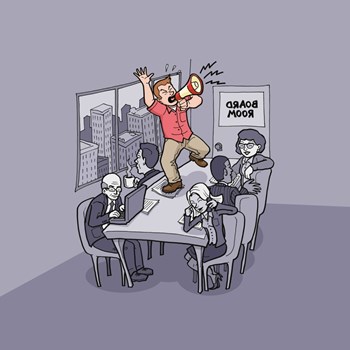
Communication is vital to running a successful condo complex or co-op building. So what happens when dwellers complain that board members are not listening and—even worse —ignoring their problems?
Well, you can bet it will not foster warm, fuzzy open lines of communication. Instead, it creates animosity and even more problems for a now unpopular, indifferent board.
It doesn’t have to be that way, of course. With a few techniques and strategies, boards can handle homeowner complaints and queries—ranging from noise, odors, pet waste, late-night furniture rearranging, leaks, squeaks—and owners can understand what to reasonably expect from their boards when it comes to resolving problems.
Here’s how it can work to the benefit of both parties to make problem solving not necessarily easier but more realistic.
Owners’ High Expectations vs.
Overworked Board
“First, owners need to understand that a board has many irons in the fire,” says Jared McNabb, PCAM, director of acquisitions for Crowninshield Management Corp. in Peabody, Massachusetts. “Board members are trying to solve problems, addressing issues, walking the property, answering questions from owners—plus reviewing correspondence, owner requests, property variances, and architectural modifications. Consequently, the board may be unable to quickly resolve an owner’s problem. Being a board member is a big job and it’s a volunteer position.”
A non-responding board doesn’t necessarily signify apathy or an indifference to the condo owner who filed a complaint, says Ronald J. Barba, Esq., a partner with the law firm of Bender, Anderson and Barba, P.C., in Hamden, Connecticut. “Boards are made up of people genuinely interested in improving the quality of life within the community. Frequently, an owner serves on a board because that person had a significant problem at one time that required attention from the board.”
What’s more, the tension between an owner and the board often lies within the documents. “The owner has not read them thoroughly and has a nebulous expectation that the HOA takes care of everything,” Barba explains. “Some residents view the association as a concierge service.” When a board says the owner is responsible for resolving the problem, it can be a bitter pill to swallow.
On the flip side, sometimes a board extends theses expectations unwittingly. “The board members may not want to want to offend; they want to help. They can be punished for having good intentions,” he adds.
Being elected to a co-op or a condo board certainly comes with ample power and an enormous amount of responsibility to govern and make decisions on behalf of that community often referred to as the board's “fiduciary duty.” Most communities, depending upon their size, have three to seven elected board members serving terms of one to three years. Boards typically meet monthly but some will convene quarterly or even once or twice a year.
Set a Protocol to be Seen and Heard
Getting the board aware of and paying attention to an owner’s problem requires careful communication and our experts agree that putting the issue in writing gets the wheels turning on finding a resolution.
“The board should set a policy and procedure for property managers to use when dealing with owners’ complaints and problems,” suggests Dan Rivers, PCAM, president, management division of G&G Management in Newton, Massachusetts. “Establish clear expectations of how the board will review the complaint and get back to the owner within a certain timeframe. Follow up is important.”
“Absolutely have a protocol in place to handle problems,” Barba concurs. “Draft a form that will contain the nature of the owner’s complaint, the acknowledgement of it by the property manager, and stipulate the manager presents it to the board at a meeting. Having direct access to address board members at this meeting will result in a greater response to the owner’s problem.”
Having a paper trail really does make a difference, says McNabb. “As a property manager, I can present the issue to the board and establish a sense of urgency. A savvy board will recommend that all communication go through a manager. The manager needs to act as the conduit for the owner. A written document is tremendously helpful in pushing an issue forward.”
Bringing the issue to the board’s attention this way also can soothe an owner feeling that his or her complaint is being overlooked. “It lets the person know his concern is heard,” he points out.
Having a proper protocol prevents board members from being accosted by owners in the supermarket checkout line or in the condo parking lot. “Board members only want to be one when it is required,” McNabb adds.
Taking Steps to Solve the Problem
“Generally, management will know if something is a common issue that needs attention,” says Rivers. “However, if the manager is unaware of a particular situation, have the board establish a policy to deal with it so a manager can solve the problem—whether it is an issue related to noise, pet waste, or smoke. The policy should have a clear set of expectations. The complaint will be reviewed and the manager will respond in a realistic timeframe. Follow up is key here.”
Be sure to explain the process of how a complaint is handled, McNabb points out. “Sometimes a board needs to do some fact-finding before an issue can be resolved. If it’s a maintenance or repair issue, the board may want to inspect the problem and come up with a repair plan.”
If the problem is between two homeowners often it can be mediated with the help of the manager, McNabb says, but all issues are different.
In addition, the reasonable amount of time necessary to respond depends upon the severity or urgency of the situation. “Ice dams this past winter were a big problem for condo communities,” Rivers says. “A manager must respond to an owner within a 24-hour time frame or even sooner to the situation of interior leaks and dangerous conditions outside. Do it as quickly as possible. Be proactive.”
However, if time is not of the essence, he suggests bringing the problem up at a monthly owner’s meeting.
Furthermore, certain problems are not easy fixes,” Rivers adds. “They will require time and attention from the board to gather information and make recommendations on how to resolve it.”
“A reasonable time to respond to a problem varies,” Barba says, “and it is subjective. If the unit is sinking, for example, it might take up to five months to fix it. On the other hand, if a pipe is leaking and the ceiling is buckling, the repair must be done faster. Fix the pipe and then worry about the cost. Act unilaterally if the board is not responding fast enough. It comes down to common sense.
“Remember, the board directs, the manager implements,” he adds.
A Personal Touch Goes a Long Way
To help improve a board’s response time and alleviate residents’ concerns that they are not being heard, Rivers stresses personally following up with an owner buys a lot of good will. “Acknowledging that the owner has been heard is so important,” Rivers emphasizes. He opts for an email approach because it works well when the matter requires a complicated explanation about resolving the situation.
Rivers also says property managers should use the systems and protocols in place to deal with problems and work to resolve them quickly, if possible.
McNabb agrees and suggests trying mediation first. “Many professionals urge boards to pursue mediation before litigation,” he says. “This can be done informally by getting a board member, the property manager, and the aggrieved parties in a room together to hash out the problem and fins a resolution.”
The Risky Business of Ignoring a Problem
What exactly, then, is a board’s legal responsibility to respond to a homeowner’s concern — and what is on the line if the board doesn’t fulfill it?
“The board exposes itself to liability for it unresponsiveness,” Barba explains. “In Connecticut, for example, the law imposes the duty of a corporate officer upon condominium board members. As such, members are bound to exercise due diligence prior to making decisions on whether or not to effect repairs. That due diligence may involve seeking a legal opinion about the association’s responsibility for any given repair. It also may include seeking opinions from contractors and/or engineers on possible remedies and costs. Any delay in the board’s responsiveness due to the search for information will not be held against it as long as the delay is reasonable.”
Of course, if a board elects to ignore information that points to its obligation to repair, it risks liability not only for the failure to repair, but also a breach of its fiduciary duty to the unit owner, according to Barba. “In Connecticut’s Common Interest Ownership Act, a board can be liable for violating the governing documents,” he adds.
Boards Must Know Their Limits
The bottom line is that a board needs to know what it can and cannot do. Resolving owner complaints can prove to be complex, cumbersome and sometimes confrontational—pitting neighbor against neighbor, owner against association.
“Of course, no one wants a situation to escalate to the level of a Hatfield–McCoy feud,” Barba says. “If the board and owners can familiarize themselves with the association documents, read them thoroughly, it will eliminate a lot of the confusion that occurs when the board and owners are misaligned in their expectations of how to resolve the dispute.”
And then they can all live happily ever after.
Cynthia Allegrezza is a freelance writer and a frequent contributor to New England Condominium.






2 Comments
Leave a Comment